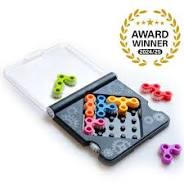Unlock Your Mind: The Power of Brain Puzzle Games
The Benefits of Brain Puzzle Games
Brain puzzle games have gained popularity in recent years as people seek ways to challenge their minds and improve cognitive function. These games come in various forms, from traditional jigsaw puzzles to digital apps that test memory, problem-solving skills, and logic.
Enhanced Cognitive Abilities
Engaging in brain puzzle games can help enhance cognitive abilities such as memory retention, concentration, and critical thinking. By solving puzzles and overcoming challenges, players stimulate different parts of the brain, leading to improved mental agility and problem-solving skills.
Stress Relief
Playing brain puzzle games can also provide a welcome escape from daily stressors. Focusing on a challenging puzzle can help distract the mind from worries and promote relaxation. The sense of accomplishment that comes from solving a difficult puzzle can boost mood and reduce anxiety.
Improved Learning Abilities
Research has shown that engaging in brain-stimulating activities like puzzle games can lead to improved learning abilities. These games encourage creativity, strategic thinking, and perseverance – qualities that are beneficial not only in gaming but also in academic and professional settings.
Enhanced Problem-Solving Skills
One of the key benefits of brain puzzle games is their ability to enhance problem-solving skills. Players are required to think critically, analyse information, and devise strategies to overcome obstacles. These skills are transferable to real-life situations where quick thinking and adaptability are essential.
Conclusion
In conclusion, brain puzzle games offer a range of benefits for individuals looking to challenge their minds and improve cognitive function. Whether played for leisure or as part of a structured brain-training regimen, these games have the potential to enhance mental acuity, reduce stress, and promote lifelong learning.
Five Benefits of Brain Puzzle Games: Boosting Cognitive Skills and Mental Agility
- Enhance cognitive abilities such as memory and critical thinking.
- Provide a fun and engaging way to challenge the mind.
- Promote stress relief and relaxation through focused gameplay.
- Improve problem-solving skills and strategic thinking.
- Offer a convenient and accessible way to boost mental agility.
Potential Drawbacks of Brain Puzzle Games: A Comprehensive Overview
- 1. Over-reliance on puzzle games may lead to neglect of other important activities.
- 2. Some individuals may experience frustration and stress when unable to solve challenging puzzles.
- 3. Excessive time spent on brain puzzle games could result in decreased social interaction.
- 4. Certain puzzle games may not cater to all skill levels, leading to feelings of exclusion for some players.
- 5. Prolonged exposure to screen-based puzzle games may contribute to eye strain and digital fatigue.
- 6. In rare cases, excessive focus on brain puzzle games could potentially exacerbate obsessive tendencies or compulsive behaviours.
Enhance cognitive abilities such as memory and critical thinking.
Engaging in brain puzzle games has been shown to significantly enhance cognitive abilities, including memory retention and critical thinking skills. By tackling challenging puzzles and problem-solving tasks, players stimulate their brains in ways that can improve memory recall, sharpen analytical thinking, and boost overall cognitive function. This mental exercise not only provides a fun and engaging pastime but also offers long-term benefits for cognitive health and mental acuity.
Provide a fun and engaging way to challenge the mind.
Brain puzzle games provide a fun and engaging way to challenge the mind, offering a stimulating environment where individuals can test their cognitive abilities while enjoying the process. By presenting complex problems and puzzles in an interactive and entertaining format, these games encourage players to think creatively, strategize effectively, and push their mental limits in a rewarding and enjoyable manner. The element of challenge combined with entertainment makes brain puzzle games a popular choice for those seeking to exercise their brains in a dynamic and engaging way.
Promote stress relief and relaxation through focused gameplay.
Brain puzzle games offer a valuable benefit by promoting stress relief and relaxation through focused gameplay. Engaging in these games allows players to immerse themselves in challenging puzzles, diverting their attention from daily stressors and providing a calming escape. The intense focus required to solve puzzles can create a meditative-like state, helping to reduce anxiety levels and promote a sense of relaxation. This aspect of brain puzzle games not only entertains but also contributes to mental well-being by offering a therapeutic outlet for unwinding and rejuvenating the mind.
Improve problem-solving skills and strategic thinking.
Engaging in brain puzzle games can significantly enhance problem-solving skills and strategic thinking. By tackling complex puzzles and challenges, players are required to analyse information, think critically, and devise effective strategies to overcome obstacles. This process not only sharpens cognitive abilities but also fosters a proactive approach to problem-solving in various real-life situations. The continuous practice of navigating through intricate puzzles in these games can lead to improved decision-making skills and a heightened sense of strategic thinking that can be applied beyond the gaming realm.
Offer a convenient and accessible way to boost mental agility.
Brain puzzle games offer a convenient and accessible way to boost mental agility. With the flexibility to play anytime and anywhere, whether on a smartphone during a commute or on a computer at home, these games provide a quick and engaging way to exercise the brain. By challenging cognitive abilities such as memory, attention, and problem-solving skills through fun and interactive puzzles, individuals can enhance their mental agility in a convenient manner that fits seamlessly into their daily routines.
1. Over-reliance on puzzle games may lead to neglect of other important activities.
Engaging excessively in brain puzzle games can potentially result in the neglect of other essential activities. Spending too much time on these games may lead individuals to prioritise them over tasks such as social interactions, physical exercise, or work responsibilities. This over-reliance on puzzle games could disrupt a balanced lifestyle and hinder personal growth in various areas. It is important for individuals to maintain a healthy balance between playing brain puzzle games and participating in other meaningful activities that contribute to overall well-being and development.
2. Some individuals may experience frustration and stress when unable to solve challenging puzzles.
Some individuals may experience frustration and stress when unable to solve challenging puzzles while engaging in brain puzzle games. The pressure to overcome difficult obstacles can lead to feelings of inadequacy and disappointment, potentially impacting the overall enjoyment of the gaming experience. It is important for players to recognise their limits and take breaks when needed to prevent excessive stress levels and maintain a healthy balance between challenge and relaxation.
3. Excessive time spent on brain puzzle games could result in decreased social interaction.
Excessive time spent on brain puzzle games could potentially lead to decreased social interaction. When individuals become engrossed in solving puzzles for extended periods, they may unintentionally isolate themselves from social interactions with friends, family, or colleagues. This could impact their ability to engage in meaningful conversations, build relationships, and participate in social activities. Finding a balance between enjoying brain puzzle games and maintaining a healthy level of social interaction is important to ensure overall well-being and mental health.
4. Certain puzzle games may not cater to all skill levels, leading to feelings of exclusion for some players.
Certain puzzle games may not cater to all skill levels, which can result in feelings of exclusion for some players. When games are too challenging or require a specific level of expertise, individuals with varying skill levels may struggle to engage fully or enjoy the experience. This lack of inclusivity can lead to frustration and discouragement, limiting the accessibility and enjoyment of brain puzzle games for a diverse range of players. It is important for game developers to consider offering options that accommodate different skill levels to ensure that all players feel welcome and challenged appropriately.
5. Prolonged exposure to screen-based puzzle games may contribute to eye strain and digital fatigue.
Prolonged exposure to screen-based puzzle games may contribute to eye strain and digital fatigue. The constant focus on a screen for extended periods can put a strain on the eyes, leading to discomfort, dryness, and potential long-term effects on vision health. Additionally, excessive screen time can contribute to digital fatigue, where individuals may experience mental exhaustion, decreased productivity, and disrupted sleep patterns. It is important for players to take regular breaks, practice proper eye care habits, and limit their screen time to mitigate these potential negative impacts associated with prolonged exposure to screen-based puzzle games.
6. In rare cases, excessive focus on brain puzzle games could potentially exacerbate obsessive tendencies or compulsive behaviours.
In rare cases, excessive focus on brain puzzle games could potentially exacerbate obsessive tendencies or compulsive behaviours. Individuals who become overly engrossed in these games may develop an unhealthy fixation on solving puzzles to the detriment of other aspects of their lives. This intense focus can lead to neglect of responsibilities, social isolation, and heightened levels of stress and anxiety. It is important for players to maintain a healthy balance and seek help if they notice signs of addictive behaviour developing as a result of their engagement with brain puzzle games.


